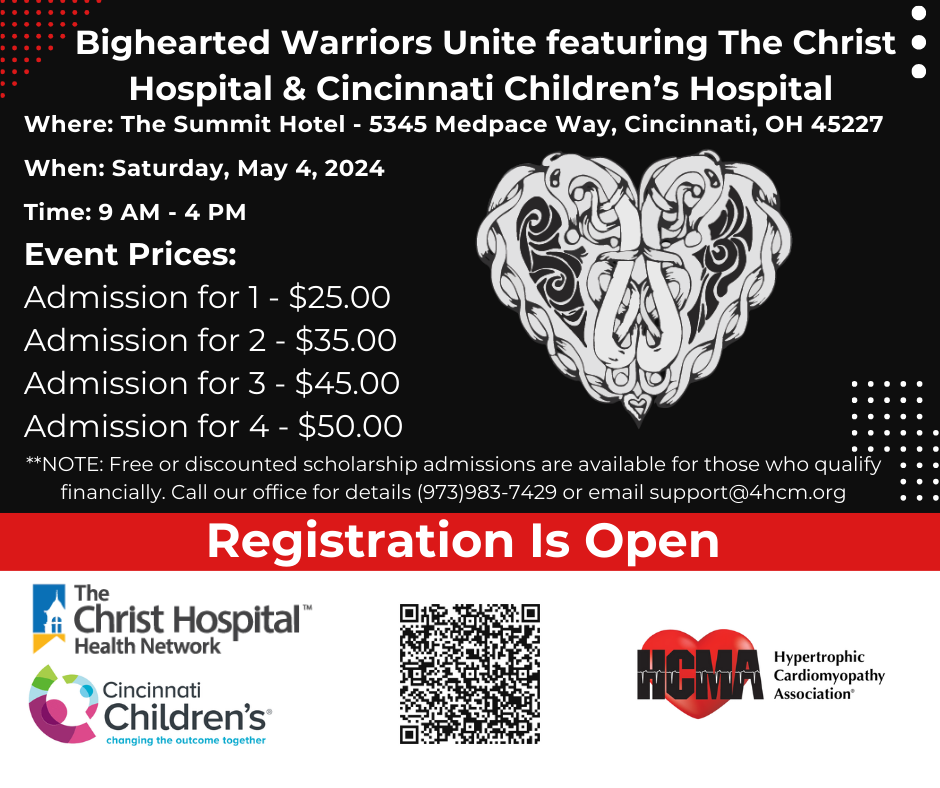
The HCMA is going on the road! We are holding our 1st in-person Bighearted Warriors Unite- Featuring The Christ Hospital & Cincinnati Children’s Hospital.
Where: The Summit Hotel – 5345 Medpace Way, Cincinnati, OH 45227
When: Saturday, May 4, 2024
Time: 9 am – 4 pm
Cost: Admission for 1 – $25.00
Admission for 2 – $35.00
Admission for 3 – $45.00
Admission for 4 – $50.00
(Breakfast & Lunch provided)
**NOTE: FREE OR DISCOUNTED SCHOLARSHIP ADMISSIONS ARE AVAILABLE FOR THOSE WHO QUALIFY FINANCIALLY. CALL THE HCMA OFFICE FOR DETAILS (973)983-7429 OR EMAIL SUPPORT@4HCM.ORG **
All proceeds go toward the HCMA Lori Fund!
The HCMA Lori Fund provides micro travel grants to HCM patients traveling to an HCMA Recognized Center of Excellence for care or HCM patients traveling to a facility for heart transplant care. Awards up to $600.00 are available per calendar year.
Our scholarship financial thresholds are based on household size and are generally three times the annual Federal Poverty Guidelines listed by the U.S. Department of Health and Human Services.
TENTATIVE AGENDA
9:00 am – Register (light breakfast provided)
9:45 am – Welcome address and opening comments from the HCMA
10:00 am- HCM Disease State Overview and Medical Therapeutics
10:30 am- Imaging in HCM
10:50 am – Future of HCM (Clinical Trials)
11:10 am – SCD Stratification/ HCM Arrhythmias
11:35 am – Q&A Panel
12:00 pm – Lunch Break (lunch provided)
1:05 pm – Generations of HCM – A Patient Perspective
1:25 pm – Surgical/ Intervention Therapies for HCM (historical and current)
1:45 pm – Genetic Testing and Future Therapeutics
2:15 pm – Pediatric HCM and Patient Journey to Adulthood (Cincinnati Children’s)
2:45 pm – Q&A Panel
3:00 pm – Closing remarks
The Christ Hospital HCM Clinic is a multidisciplinary cardiovascular program. The HCM Clinic provides patient-specific care and collaborates with subspecialties within the institution to address the complexity often associated with hypertrophic cardiomyopathy. The Christ Hospital provides a team of subspecialized cardiologists, electrophysiologists, CT, and Vascular Surgeons with various advanced diagnostic services and treatments. In addition, the HCM Clinic offers dedicated support staff, including a devoted physician’s assistant, registered nurse, HCM program coordinator, medical assistant, and HCM scheduler. The mission of The Christ Hospital’s HCM program is that they are committed to providing the highest quality of care to hypertrophic cardiomyopathy patients in our community by forming personalized strategies to empower each patient along their clinical pathway. Their vision is to “Create a seamless and accessible pathway for hypertrophic cardiomyopathy patients. The Christ Hospital HCM program is excited to be able to offer a nationally respected team of physicians and have at our patient’s disposal today’s most advanced therapies for the treatment and management of hypertrophic cardiomyopathy.”
HCM Program Director Dr. Wojciech Mazur and HCM Program Co-Director Dr. Ankit Bhatia say, “Our HCM clinical team recognizes the uniqueness of each individual patient diagnosed with HCM. We truly pride ourselves in the time we spend getting to know more about their challenges and victories. Our working relationship with the HCMA has made us more aware of the needs of HCM patients, and we have modeled our program to address current gaps in HCM management. The Christ Hospital Hypertrophic Cardiomyopathy Clinic is the second center of excellence in the state of Ohio, which will now open up more opportunities for our community. We are excited to offer our patients the most up-to-date medical management as well as enrollment into ground-breaking research trials.”
Team Members:
Wojciech Mazur, MD HCM Clinic Director
Ankit Bhatia, MD HCM Clinic Co-Director
J Michael Smith, MD Surgery
Dean Kereiakes, MD Interventional Cardiology
Puvi Seshiah, MD Interventional Cardiology
Edward Schloss, MD Electrophysiology
Daniel Pelchovitz, MD Electrophysiology
Gregory Egnaczyk, MD Advanced Heart Failure
Burns Blaxall, PHd Genetics
Courtney Hannum, LGC Genetics
Abigail Patterson, PA Physician Assistant
Cassady Palmer, Cardiac Research Sonographer
Please visit for more information about The Christ Hospital Health Network HCM Program – Cincinnati, OH please visit: https://4hcm.org/christhosp/
To learn more and register about the in-Person Bighearted Warriors Unite event, visit: https://4hcm.org/inspire_events/in-person-bighearted-warriors-unite-featuring-the-christ-hospital-cincinnati-oh/
For more information on all HCMA Recognized Centers of Excellence, please visit https://4hcm.org/center-of-excellence/.
The post The Christ Hospital Health Network HCM Program – Cincinnati, OH appeared first on Hypertrophic Cardiomyopathy Association.


 Translate
Translate


